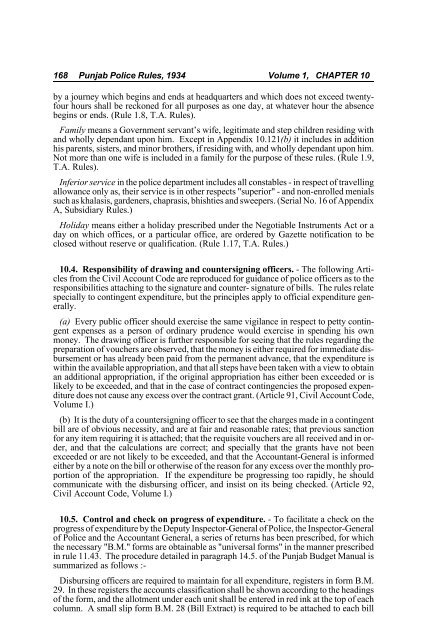Punjab Police Rules Volume 1 - Sangrur Police
Punjab Police Rules Volume 1 - Sangrur Police
Punjab Police Rules Volume 1 - Sangrur Police
Create successful ePaper yourself
Turn your PDF publications into a flip-book with our unique Google optimized e-Paper software.
168 <strong>Punjab</strong> <strong>Police</strong> <strong>Rules</strong>, 1934 <strong>Volume</strong> 1, CHAPTER 10<br />
by a journey which begins and ends at headquarters and which does not exceed twentyfour<br />
hours shall be reckoned for all purposes as one day, at whatever hour the absence<br />
begins or ends. (Rule 1.8, T.A. <strong>Rules</strong>).<br />
Family means a Government servant’s wife, legitimate and step children residing with<br />
and wholly dependant upon him. Except in Appendix 10.121(b) it includes in addition<br />
his parents, sisters, and minor brothers, if residing with, and wholly dependant upon him.<br />
Not more than one wife is included in a family for the purpose of these rules. (Rule 1.9,<br />
T.A. <strong>Rules</strong>).<br />
Inferior service in the police department includes all constables - in respect of travelling<br />
allowance only as, their service is in other respects "superior" - and non-enrolled menials<br />
such as khalasis, gardeners, chaprasis, bhishties and sweepers. (Serial No. 16 of Appendix<br />
A, Subsidiary <strong>Rules</strong>.)<br />
Holiday means either a holiday prescribed under the Negotiable Instruments Act or a<br />
day on which offices, or a particular office, are ordered by Gazette notification to be<br />
closed without reserve or qualification. (Rule 1.17, T.A. <strong>Rules</strong>.)<br />
Rule 10.4<br />
10.4. Responsibility of drawing and countersigning officers. - The following Articles<br />
from the Civil Account Code are reproduced for guidance of police officers as to the<br />
responsibilities attaching to the signature and counter- signature of bills. The rules relate<br />
specially to contingent expenditure, but the principles apply to official expenditure generally.<br />
(a) Every public officer should exercise the same vigilance in respect to petty contingent<br />
expenses as a person of ordinary prudence would exercise in spending his own<br />
money. The drawing officer is further responsible for seeing that the rules regarding the<br />
preparation of vouchers are observed, that the money is either required for immediate disbursement<br />
or has already been paid from the permanent advance, that the expenditure is<br />
within the available appropriation, and that all steps have been taken with a view to obtain<br />
an additional appropriation, if the original appropriation has either been exceeded or is<br />
likely to be exceeded, and that in the case of contract contingencies the proposed expenditure<br />
does not cause any excess over the contract grant. (Article 91, Civil Account Code,<br />
<strong>Volume</strong> I.)<br />
(b) It is the duty of a countersigning officer to see that the charges made in a contingent<br />
bill are of obvious necessity, and are at fair and reasonable rates; that previous sanction<br />
for any item requiring it is attached; that the requisite vouchers are all received and in order,<br />
and that the calculations are correct; and specially that the grants have not been<br />
exceeded or are not likely to be exceeded, and that the Accountant-General is informed<br />
either by a note on the bill or otherwise of the reason for any excess over the monthly proportion<br />
of the appropriation. If the expenditure be progressing too rapidly, he should<br />
communicate with the disbursing officer, and insist on its being checked. (Article 92,<br />
Civil Account Code, <strong>Volume</strong> I.)<br />
Rule 10.5<br />
10.5. Control and check on progress of expenditure. - To facilitate a check on the<br />
progress of expenditure by the Deputy Inspector-General of <strong>Police</strong>, the Inspector-General<br />
of <strong>Police</strong> and the Accountant General, a series of returns has been prescribed, for which<br />
the necessary "B.M." forms are obtainable as "universal forms" in the manner prescribed<br />
in rule 11.43. The procedure detailed in paragraph 14.5. of the <strong>Punjab</strong> Budget Manual is<br />
summarized as follows :-<br />
Disbursing officers are required to maintain for all expenditure, registers in form B.M.<br />
29. In these registers the accounts classification shall be shown according to the headings<br />
of the form, and the allotment under each unit shall be entered in red ink at the top of each<br />
column. A small slip form B.M. 28 (Bill Extract) is required to be attached to each bill


